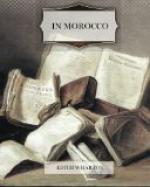The eldest of the group, and evidently the mistress of the house, was an Algerian lady, probably of about fifty, with a sad and delicately-modelled face; the others were daughters, daughters-in-law and concubines. The latter word evokes to occidental ears images of sensual seduction which the Moroccan harem seldom realizes. All the ladies of this dignified official household wore the same look of somewhat melancholy respectability. In their stuffy curtained apartment they were like cellar-grown flowers, pale, heavy, fuller but frailer than the garden sort. Their dresses, rich but sober, the veils and diadems put on in honour of my visit, had a dignified dowdiness in odd contrast to the frivolity of the Imperial harem. But what chiefly struck me was the apathy of the younger women. I asked them if they had a garden, and they shook their heads wistfully, saying that there were no gardens in Old Fez. The roof was therefore their only escape: a roof overlooking acres and acres of other roofs, and closed in by the naked fortified mountains which stand about Fez like prison-walls.
After a brief exchange of compliments silence fell. Conversing through interpreters is a benumbing process, and there are few points of contact between the open-air occidental mind and beings imprisoned in a conception of sexual and domestic life based on slave-service and incessant espionage. These languid women on their muslin cushions toil not, neither do they spin. The Moroccan lady knows little of cooking, needlework or any household arts. When her child is ill she can only hang it with amulets and wail over it, the great lady of the Fazi palace is as ignorant of hygiene as the peasant-woman of the bled. And all these colourless eventless lives depend on the favour of one fat tyrannical man, bloated with good living and authority, himself almost as inert and sedentary as his women, and accustomed to impose his whims on them ever since he ran about the same patio as a little short-smocked boy.
The redeeming point in this stagnant domesticity is the tenderness of the parents for their children, and western writers have laid so much stress on this that one would suppose children could be loved only by inert and ignorant parents. It is in fact charming to see the heavy eyes of the Moroccan father light up when a brown grass-hopper baby jumps on his knee, and the unfeigned tenderness with which the childless women of the harem caress the babies of their happier rivals. But the sentimentalist moved by this display of family feeling would do well to consider the lives of these much-petted children. Ignorance, unhealthiness and a precocious sexual initiation prevail in all classes. Education consists in learning by heart endless passages of the Koran, and amusement in assisting at spectacles that would be unintelligible to western children, but that the pleasantries of the harem make perfectly comprehensible to Moroccan infancy. At eight or nine the little girls are married, at twelve the son of the house is “given his first negress”; and thereafter, in the rich and leisured class, both sexes live till old age in an atmosphere of sensuality without seduction.




